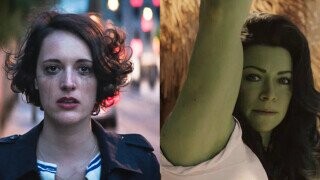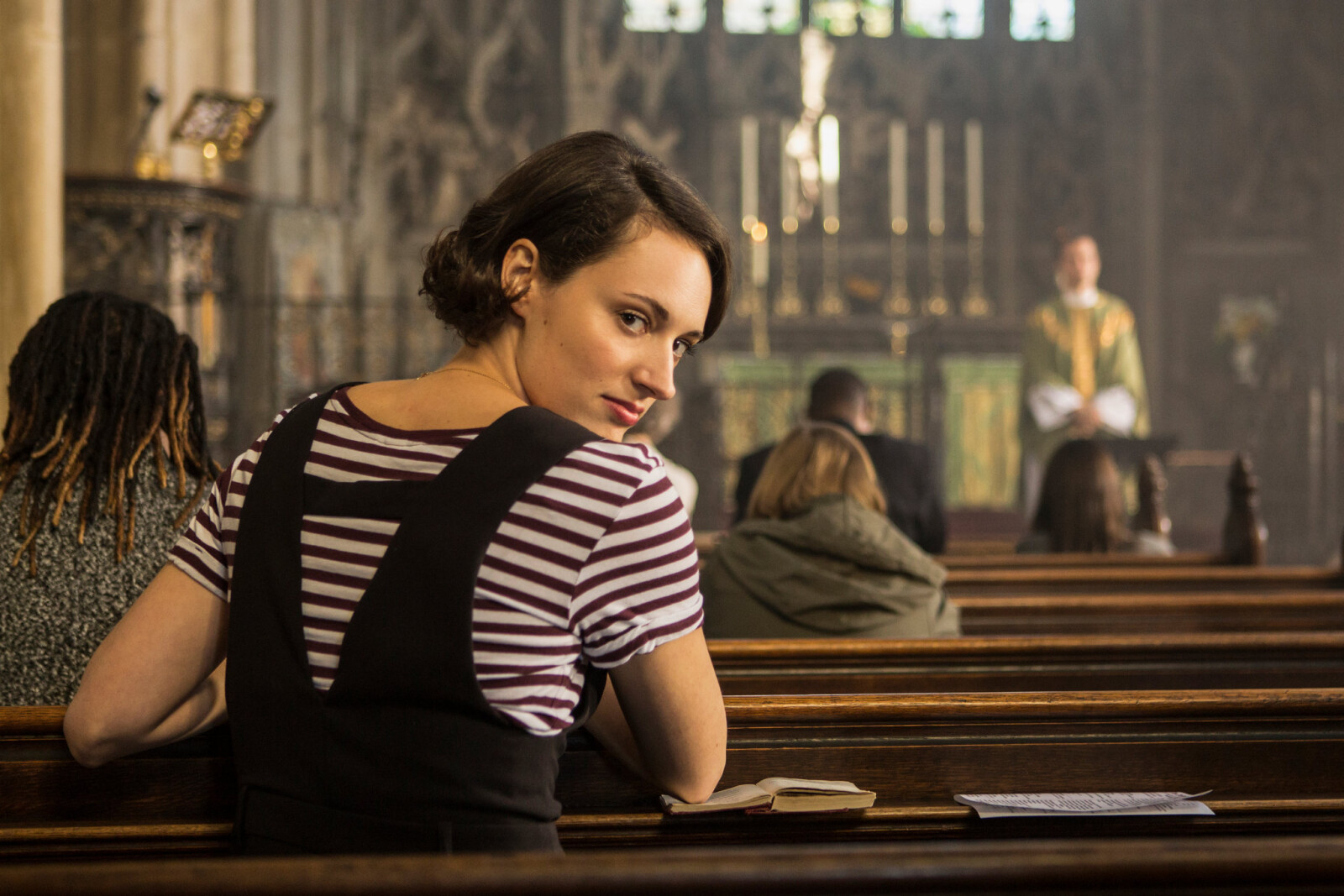Why We're Fearful That She-Hulk Will Steal Fleabag’s Comedy Conceit

This past week, we saw a glimpse into the writing process of Marvel’s highly anticipated new series She-Hulk: Attorney at Law, which is set to premiere next month on Disney+. Head writer Jessica Gao and star Tatiana Maslany spoke at length about the tone of the show, as well as Gao’s biggest inspiration for the creation of the latest TV entry of the MCU’s Phase Four. Gao identified Phoebe Waller-Bridge’s sensational series Fleabag as the model for She-Hulk’s humor and style, a comparison which has the intersection of fans of both properties elated and excited for the upcoming off-kilter action/comedy/courtroom drama series.
At first glance, this seems like a stylistic crossover that would breathe new life into the superhero genre and revitalize the comedic sensibilities of a franchise in which the quips and jabs have gone stale over the last few films. Jessica Gao is certainly the best person for the job of fixing Marvel’s funny bone – the accomplished writer and producer has worked on shows such as Robot Chicken, Silicon Valley, and Rick and Morty. She even wrote the “Pickle Rick” episode of the latter, which won her an Emmy and started perhaps the most insufferable of in-jokes in Internet fandom history.
Don't Miss
But the merging of Phoebe Waller-Bridge's unique style with the bombastic aesthetic of a superhero series has us nervous. Fleabag is about as far from an action blockbuster as you can get, and the strength of the series comes from its subtleties. Marvel projects are many great things, but “subtle” ain’t one of them. Fleabag features its main character speaking directly to the audience as a narrative tool, and if She-Hulk’s official trailer is a good indicator, the superhero show will have a lead character regularly break the fourth wall for the first time in the MCU canon (Deadpool technically hasn’t yet made the jump to Disney). This stylistic shift could derail the tone of the series and introduce storytelling elements to the MCU that have the potential to make Marvel’s attempts at comedy even more unbearable if handled poorly.
If you haven’t seen Fleabag, then you’re wasting precious time reading Cracked articles instead of watching the most innovative and compelling comedy show of the last decade. Phoebe Waller-Bridge wrote and starred in the series that seamlessly blended black comedy, cringe humor, and deeply moving drama over a complicated, unflinching, and anarchic two seasons while racking up a half-dozen Emmys in the process. Fleabag was a completely singular show that was carried by the thoughtfulness of Waller-Bridge’s writing as well as the fearlessness of her performance.
But what made Fleabag so interesting from a narrative standpoint was that the climactic events of the main character’s life happened before the start of the series. Fleabag wasn’t about Waller-Bridge going on an adventure or overcoming obstacles, it was about her picking up the pieces of a life that we, the audience, never knew. The exposition was given to us almost entirely in subtext. The flashbacks only offered us small glimpses of the past – rarely did Fleabag allow us to see the whole picture.

Contrast that with the storytelling techniques used by Marvel – the only times we’re introduced to new superheroes without half an hour of expository dialogue and origin story explanation is with characters like Spider-Man, a hero whose background is already so ubiquitously known that another iteration of “with great power comes great responsibility” would be completely redundant.
The humor of Fleabag comes mostly from the sheer shamelessness of its title character – Fleabag lies, curses, starts fights, ruins dinners, and wrecks her life as best she can in the most absurdly believable manner. She’s not a hero. She’s not even an anti-hero. She’s just Fleabag. She is an impulsive, aimless, often selfish, deeply flawed, and outrageously funny trainwreck of a human being. Great comedy comes from truth, and Fleabag bombards you with both of those things in droves. Fleabag’s flaws expose her humanity, and Waller-Bridge allows her to sink to unthinkable lows in order to draw out that honesty.
That’s not really how Marvel does protagonists. Jennifer Walters, also known as She-Hulk, is a successful attorney and the first cousin of Bruce Banner, also known as He-Hulk. As Jessica Gao put it, “She’s this highly educated woman whose life gets completely thrown off track… I really wanted her to have a well-rounded life.” She-Hulk appears to be a show about a successful, put-together lawyer whose idyllic existence is interrupted by forces outside her control, which puts the lead character in stark contrast to Fleabag, whose life fell apart as the result of her own self-destructive behavior snowballing into truly awful decisions. Fleabag’s humor comes from Fleabag shooting herself in the foot, and it’s hard to see how that will translate to a show about a happy-go-lucky lawyer whose career gets derailed by surprise superpowers.
The biggest concern we have for this Fleabag-inspired superhero story is about the signature framing device of Fleabag, wherein Fleabag narrates the events of her own life in real-time to a camera that is only visible to her. Fleabag is far from the first TV show to have a character break the fourth wall in this way, but the internal logic for the device is what sets Fleabag apart. It is heavily implied by the events of the second season that Fleabag’s asides to the camera are a coping mechanism. They’re a way for her to distance herself from her own life, and they only start to break down when she finds something that makes being vulnerable worth it.
Our fear is that the decision-makers at Disney will see this style choice as an excuse to turn She-Hulk into another Deadpool. While the source material for She-Hulk often included meta-commentary, we worry that the nods to the camera will be used as an easy way to cram even more Joss Whedon-y quips into a format already bursting with incessant zingers that cut the tension any time the film/TV show threatens to get serious. Fleabag didn’t just add narration so that Phoebe Waller-Bridge could show off how witty she is. Fleabag used the audience to hide from her life. Her asides were a way for her to dissociate and to see her life the way the audience sees it – as a bizarre, hilarious story with the occasional glimpses of a dark, depressing level just below the surface.
We don’t yet know how Jessica Gao and her team will choose to handle these fourth wall breaks, or how they will hope to bring the chaotic, sarcastic, and occasionally deeply mournful humor of Fleabag to a series about muscular green people punching bad guys. But if there’s anyone who can pull it off, it’s the writer responsible for one of the best scenes in one of the best comedies currently on television. The last scene at the therapist’s office in “Pickle Rick” showed a glimpse of the kind of thoughtfulness and honesty that Phoebe Waller-Bridges brought to every episode of Fleabag.
We hope that Disney gives Gao the kind of creative license they gave the creators of WandaVision and allows the show to tread into uncertain territory. We hope that one of the best writers in television will pay respectful homage to the best TV show since Breaking Bad. And we pray to the spirit of Stan Lee that Marvel fans don’t end up calling Fleabag “that She-Hulk show with the British lady.”
Top Image: Two Brothers Pictures
For exclusive ComedyNerd content, subscribe to our spiffy newsletter:
